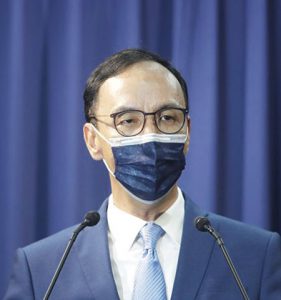Bloomberg
China blasted Taiwanese opposition leader Eric Chu after he appeared to play down a key agreement between the two sides, in a sign of new frictions between Beijing and its traditional negotiating partner in Taipei.
Taiwan Affairs Office (TAO) spokesman Ma Xiaoguang criticised Chu for remarks in the US in which he called the agreement that both sides
are part of “one China†as a “non-consensus consensus.†Ma said that the 1992 consensus, which has underpinned decades of talks between the Communist Party and Chu’s Kuomintang, “brooks no arbitrary distortion.â€
The TAO spokesman also appeared to take issue with Chu’s efforts to build US
support with his speech to the Brookings Institution in Washington.
“Taiwan is a part of China and cross-strait affairs are a family affair,†Ma said. “It should be solved through discussions among family members. It doesn’t need to involve any outsiders.â€
The dustup illustrated the political challenges facing any efforts to ease current tensions between China and Taiwan, a dispute widely seen as a potential flash point for a broader conflict involving the US. While the KMT remains Taiwan’s most influential advocate for closer ties with the mainland, Chu must also
balance relations with the Washington and a voting public that’s increasing skeptical of Beijing’s intentions.
In his speech, Chu challenged perceptions that the KMT was allied with Beijing. “We are mislabeled by some people or some media saying we are a pro-China party. It’s totally wrong. We are a pro-US party forever,†he said,
also highlighting the party’s alliance with Washington through World War Two and into the Cold War.
The KMT is trying to claw back power after a series of election defeats that has given the China-skeptic Democratic Progressive Party control of the presidency and the legislature.
Taiwanese President Tsai Ing-wen has maintained support in part by contrasting democratically ruled
Taiwan with Communist-controlled China.
Chu exchanged warm messages with Chinese President Xi Jinping after his election as KMT chief in September, fuelling speculation that the Taiwanese opposition party might seek to actively court Beijing. Chu, however, criticised China’s political system during his visit to the US, in which he reopened the KMT’s representative office after a
13-year hiatus.
 The Gulf Time Newspaper One of the finest business newspapers in the UAE brought to you by our professional writers and editors.
The Gulf Time Newspaper One of the finest business newspapers in the UAE brought to you by our professional writers and editors.
